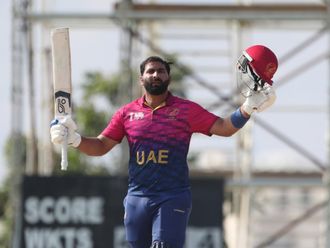The Gulf Cup is a tournament quite like no other. An anomaly in world football given that it isn’t recognised by Fifa and doesn’t fit into the Fifa calendar, it therefore has little to no international recall or significance. But regionally it means everything to the eight countries that participate.
Let’s be honest, few of the eight, barring Saudi Arabia, regularly qualify for a World Cup, and occasionally sides like the UAE and Saudi do make the semi-finals of the Asian Cup. But in the Gulf Cup, most of the eight have a real chance of winning, and given the regional footballing rivalries at play, everyone ups their game to do just that.
You would have thought that local powerhouses Saudi, the side from the region to have qualified to the World Cup the most, and to have won the Asian Cup the most times, would rule the roost in the Gulf Cup. But interestingly it’s this year’s hosts Kuwait who hold the record most wins, just going to show that the form book really goes out the window when matters of regional pride are at stake. And it’s this unpredictability that makes it so exciting.
It’s also a nice and simple little two-week format too, two groups of four filtering the best two sides from each group into a semi-final and final to determine the ultimate in regional footballing superiority.
Put simply, this is their World Cup finals, the one tournament where regional countries get to really compete together and have a genuine shot at glory.
Unlike World Cups and Asian Cups, which may be hosted thousands of miles away, fans from each of the eight countries can actually travel en masse to the Gulf Cup as well, wherever it is held in the region. This adds to the occasion and makes it a real cultural as well as sporting celebration.
The bigger picture should be winning the Asian Cup and qualifying to a World Cup, and don’t get us wrong, real inroads have been made, but such is the importance of this tournament held every two years, that logic and long-term plans will go out the window. A coach could be brought in with a view to the next World and Asian Cup cycle but if they fail to get out of the group or lose their opening game against their local rival, they are for the exit.
This year’s tournament seems a little understated given that it was only confirmed as going ahead as recently as last week after a swift change in host from Qatar to Kuwait. But it’s that uncertainty and scrambling together to make it work whatever the cost that makes it what it is. And as soon as the tournament kicks-off there will be no doubt as to whether it’s on this year or not.












